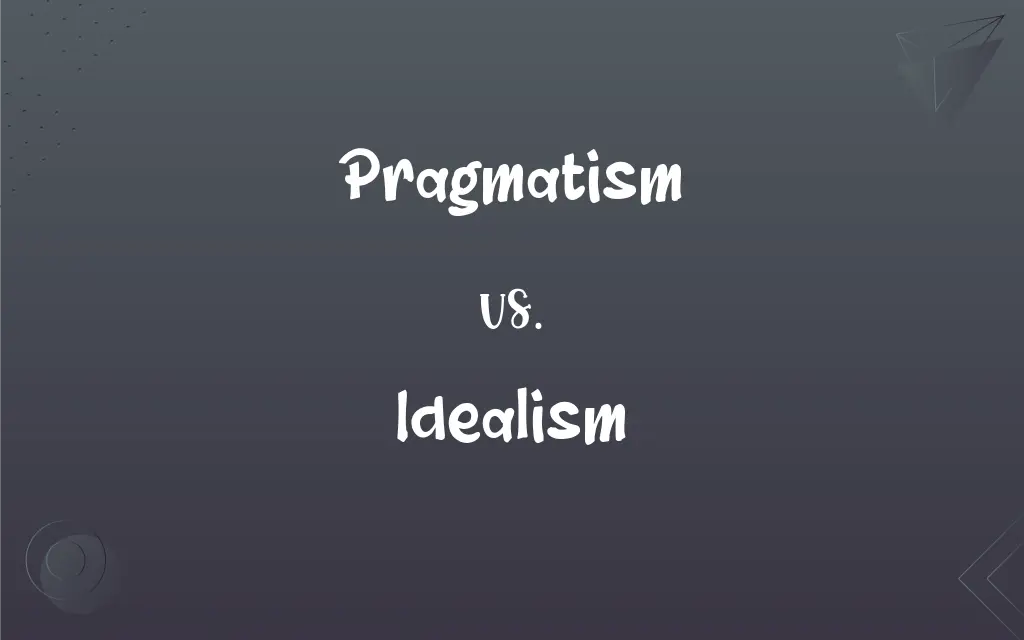Pragmatism vs. Idealism: What's the Difference?
Edited by Janet White || By Harlon Moss || Published on December 31, 2023
Pragmatism focuses on practical approaches and results, whereas idealism emphasizes abstract, often unachievable, ideals.

Key Differences
Pragmatism is a philosophy prioritizing practicality and efficiency in addressing issues, focusing on outcomes and real-world applications. Idealism, in contrast, is guided by moral, ethical, or visionary ideals, often without regard to practicality.
In pragmatism, decisions are made based on what works best in a given situation, emphasizing adaptability and problem-solving. Idealism, however, involves striving for a perfect model or ideal, sometimes at the expense of practical solutions.
Pragmatists value concrete evidence and experience, basing beliefs on what can be observed and tested. Idealists, conversely, are driven by their convictions about what ought to be, often based on philosophical or theoretical principles.
Pragmatism is often associated with a flexible approach, willing to change methods for better outcomes. Idealism, in contrast, can be rigid, holding firm to ideals regardless of practical constraints or consequences.
In pragmatism, success is measured by tangible results and effectiveness. Idealism measures success by the degree to which actions align with moral or ethical standards, regardless of practical outcomes.
ADVERTISEMENT
Comparison Chart
Basis of Decision
Practicality and outcomes
Moral or ethical ideals
Approach to Problems
Adaptable, problem-solving
Visionary, sometimes impractical
Guiding Principle
What works in reality
What should ideally be
Flexibility
High, changes with evidence
Low, adheres to ideals
Measurement of Success
Tangible results
Alignment with ideals
ADVERTISEMENT
Pragmatism and Idealism Definitions
Pragmatism
A focus on practical solutions and results.
Her pragmatism helped solve the crisis quickly.
Idealism
Emphasis on moral or ethical standards.
Her idealism was reflected in her commitment to honesty.
Pragmatism
Valuing efficiency and effectiveness.
Her pragmatism was evident in her straightforward solutions.
Idealism
Visionary thinking, often disregarding practicality.
Their idealism led them to dream of a perfect society.
Pragmatism
Adaptability to changing circumstances.
Pragmatism allowed them to adjust their strategy effectively.
Idealism
Upholding ideals regardless of feasibility.
Her idealism kept her dedicated to unreachable goals.
Pragmatism
Emphasis on experience and empirical evidence.
His pragmatism led him to trust tested methods.
Idealism
Pursuit of high ideals and principles.
His idealism drove him to fight for social justice.
Pragmatism
Practicality over theoretical considerations.
The team's pragmatism favored a more realistic approach.
Idealism
Focus on what should be, not what is.
His idealism often clashed with the harsh realities.
Pragmatism
(Philosophy) A movement consisting of varying but associated theories, originally developed by Charles S. Peirce and William James and distinguished by the doctrine that the meaning or truth value of an idea or a proposition lies in its observable practical consequences.
Idealism
The act or practice of envisioning things in an ideal and often impractical form.
Pragmatism
A practical, matter-of-fact way of approaching or assessing situations or of solving problems.
Idealism
Pursuit of one's ideals, often without regard to practical ends.
Pragmatism
The pursuit of practicality over aesthetic qualities; a concentration on facts rather than emotions or ideals.
Pragmatism
(politics) The theory that political problems should be met with practical solutions rather than ideological ones.
Pragmatism
(philosophy) The idea that beliefs are identified with the actions of a believer, and the truth of beliefs with success of those actions in securing a believer's goals; the doctrine that ideas must be looked at in terms of their practical effects and consequences.
Pragmatism
The habit of interfering in other people's affairs; meddlesomeness.
Pragmatism
The quality or state of being pragmatic; in literature, the pragmatic, or philosophical, method.
The narration of this apparently trifling circumstance belongs to the pragmatism of the history.
Pragmatism
(philosophy) the doctrine that practical consequences are the criteria of knowledge and meaning and value
Pragmatism
The attribute of accepting the facts of life and favoring practicality and literal truth
FAQs
How do pragmatists approach problems?
Pragmatists focus on practical, adaptable solutions based on experience and evidence.
What is pragmatism?
Pragmatism is a philosophy that emphasizes practicality and real-world application in decision-making.
What guides an idealist in decision-making?
Idealists are guided by their principles and ideals, often prioritizing these over practicality.
Do pragmatists ignore moral values?
Pragmatists don't necessarily ignore morals, but they prioritize practical outcomes.
Can pragmatism and idealism coexist?
While different, pragmatism and idealism can coexist, balancing practical approaches with idealistic goals.
Is pragmatism better than idealism?
Neither is inherently better; the effectiveness of each depends on the context and goals.
What is idealism?
Idealism is a philosophical approach that prioritizes ideals, often moral or ethical, above practical considerations.
Does idealism always disregard practicality?
Not necessarily. Some idealists strive to find practical ways to achieve their ideals.
Can idealism inspire innovation?
Yes, idealism can inspire innovative thinking by envisioning new possibilities.
Can a person be both pragmatic and idealistic?
Yes, it's possible to blend practical approaches with idealistic visions.
How might idealism influence educational approaches?
In education, idealism can foster a focus on holistic, values-based learning.
Does idealism contribute to social change?
Yes, idealism often drives efforts towards significant social and ethical changes.
How do pragmatists view change?
Pragmatists typically view change as necessary and adapt their strategies accordingly.
How do pragmatism and idealism affect leadership styles?
Pragmatic leaders focus on practical solutions, while idealistic leaders may prioritize vision and values.
Are idealists always unrealistic?
Not always. Idealists can be practical, though they prioritize ideals over practicality.
Can pragmatism lead to short-term thinking?
Yes, pragmatism can sometimes focus too much on immediate results, overlooking long-term implications.
How does pragmatism affect business decisions?
In business, pragmatism often leads to decisions based on profitability and feasibility.
Is pragmatism a form of realism?
Yes, pragmatism is often considered a form of realism, focusing on what is practical and achievable.
Are pragmatic solutions always the most effective?
Not always. Sometimes, pragmatic solutions may overlook deeper or more complex issues.
Are idealists often activists?
Many idealists are activists, as they strive to align reality with their ideals.
About Author
Written by
Harlon MossHarlon is a seasoned quality moderator and accomplished content writer for Difference Wiki. An alumnus of the prestigious University of California, he earned his degree in Computer Science. Leveraging his academic background, Harlon brings a meticulous and informed perspective to his work, ensuring content accuracy and excellence.
Edited by
Janet WhiteJanet White has been an esteemed writer and blogger for Difference Wiki. Holding a Master's degree in Science and Medical Journalism from the prestigious Boston University, she has consistently demonstrated her expertise and passion for her field. When she's not immersed in her work, Janet relishes her time exercising, delving into a good book, and cherishing moments with friends and family.






































































